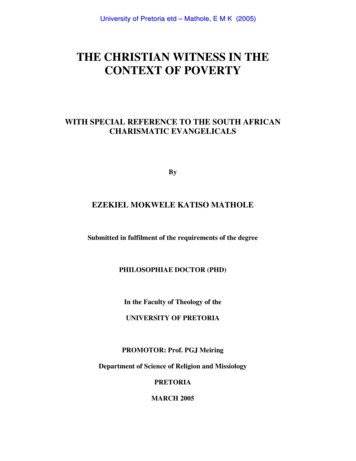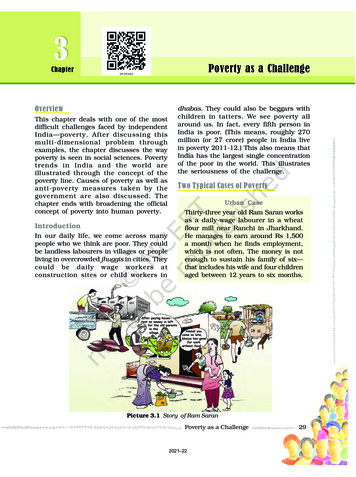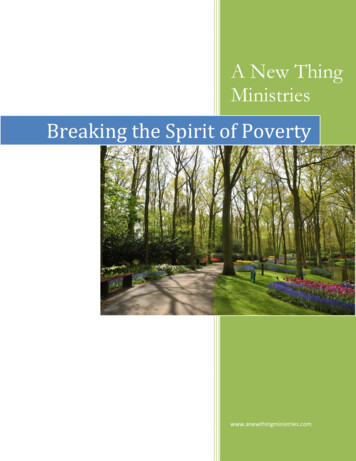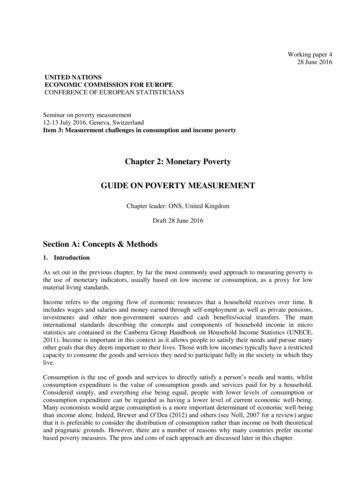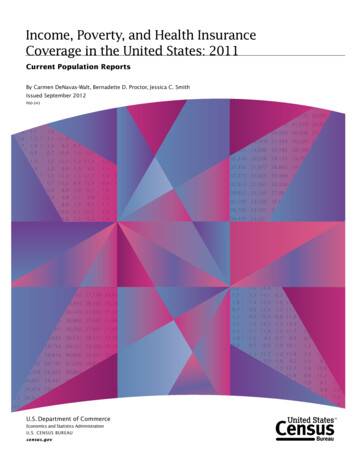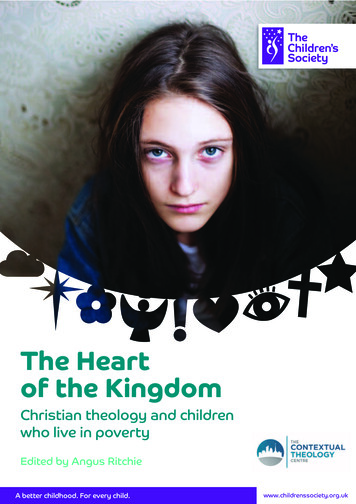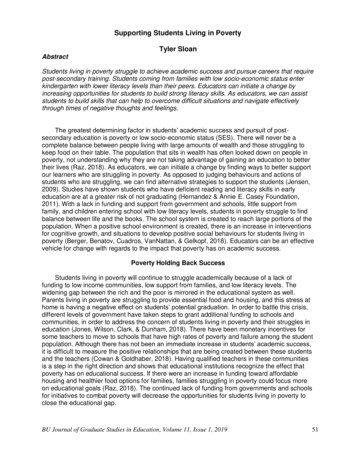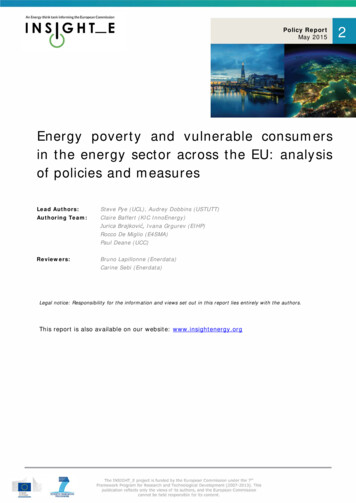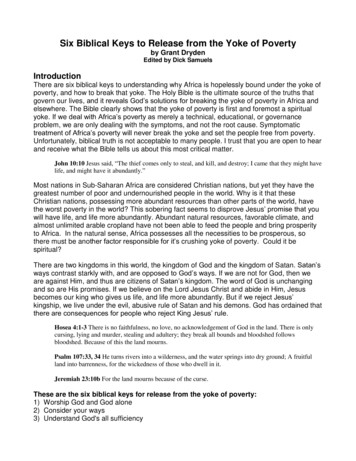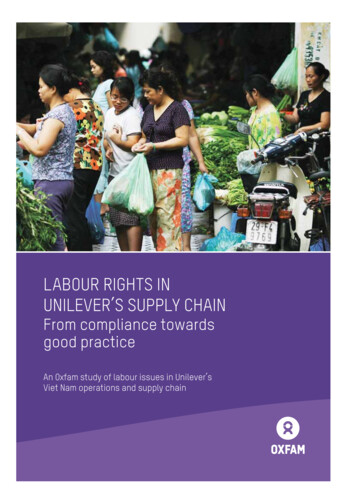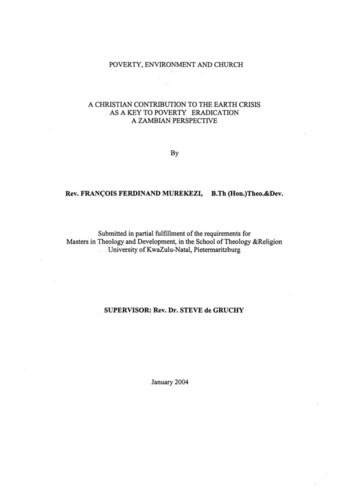
Transcription
POVERTY, ENVIRONMENT AND CHURCHA CHRISTIAN CONTRIBUTION TO THE EARTH CRISISAS A KEY TO POVERTY ERADICATIONA ZAMBIAN PERSPECTIVEByRev. FRANCOIS FERDINAND MUREKEZI,B.Th (Hon.)Theo.&Dev.Submitted in partial fulfillment of the requirements forMasters in Theology and Development, in the School of Theology &ReligionUniversity of KwaZulu-Natal, PietermaritzburgSUPERVISOR: Rev. Dr. STEVE de GRUCHYJanuary 2004
iDECLARATIONI, Francois Ferdinand Murekezi, hereby declare that this whole dissertation, unlessspecifically indicated to the contrary in the text, represents my original work.I also declare that I have not otherwise submitted this dissertation in any form for anydegree purpose or examination to any university.SignatureDate?.9Z?/.2.9.9.y.&S& e.dL&*?As Supervisor, I agree to submission of this thesisDate (/ocfjot Rev. Dr. Steve de Gruchy
iiACKNOWLEDGEMTNSI am indebted to acknowledge many people for their contribution in writing thisdissertation.Firstly, I wish to express my appreciation to my supervisor Dr. Steve de Gruchy whomade an extra effort on my dissertation. Without his wisdom, assistance, patience insupervising my work, discussion, orientation on each chapter it would not have beeneasy for me to accomplish this academic task. I heartily thank him for his spiritualityand theological orientation in this dissertation.Secondly, the financial support given by the University of KwaZulu-Natal (Formallythe University of Natal), and my friends: Ms. Joan Sanderson, Les and Mary Boltonand Chris Stewart is acknowledged.Thirdly, I acknowledge, and register my heartfelt thanks to my wife AnnonciataNyirataburka, and my two daughters Holiness Namahora and Hope Mwiza for love,spiritual and moral support and care they have expressed through thus busy time.Fourthly, I would like to express appreciation for moral and spiritual support given tome by the community of the Theological College of Central Africa, the members andleadership of the Free Methodist Church in Zambia presided by Bishop Z.L Shembe.Indeed, I owe thanks to Emeritus Bishop Aaron and his wife Edith for the parentallove and advice that they gave during my staying here in South Africa.Fifthly, I wish to thank Trish McLean of the University of KwaZulu-Natal LanguageCentre, and Ron Zeiner of Evangelical Seminary of Southern Africa who assistedwith error correction.Last but not least, my acknowledgement goes to the family of Vestine and EzekielNtakirutimana for encouragement, and hospitality afforded to me whilst doing mystudies.
iiiABSTRACTThe environmentaLcrisis and the poverty crisis .are among the major challenges theChurch in Zambia is facing. In this work I argue that poverty and the ecological crisesare interrelated. However, a major problem has been that many programmes carriedon by the Churches or church based organizations seem to focus on povertyalleviation not recognizing the linkage between poverty and the ecological crisis. Fortrujjsasojvlhis-study, represents the situation of poverty in Zambia and indicates itsIjnksjo the environmental crisis.The aim of this dissertation is to remind the Free Methodist Church in Zambia and theChurch in Zambia in general, that as Christians we are mandated to respond to thesesocial issues of poverty and ecological degradation. We have the theoretical andtheological contributions necessary to address the above two challenges, if we arekeen to transform and build up the community we are ministering to. What is neededis to put into practice our beliefs.I argue that unless adequate environmentalawareness is carried out, and that Christians understand the relationship betweenpoverty and the ecological crisis we will not manage to break the cycle of poverty inthe community. The Church efforts to carry out environmental awareness based onbiblical and theological foundation teachings are a unique contribution that Christianscan offer to respond to the earth crisis as well as to contribute to poverty eradication.
ivTABLE OF CONTENTDeclarationAcknowledgementsAbstractTable of contentAbbreviationsiiiiiiivviiCHAPTER 1: GENERAL INTRODUCTION1.1 Introduction1.2 Motivation.1.3 Literature review1.4 Research problem1.5 Research hypothesis1.6 Theoretical1.7 Methodology of research1.8 Limitations of research1.9 Outline of chaptersframework124577778CHAPTER 2. POVERTY AND THE ENVIRONMENT SITUATION INTHE ZAMBIAN CONTEXT2.0 Introduction2.1 The poverty situation in the Zambian context2.1.1 What is poverty in the Zambian context2.1.2 Causes of poverty in Zambia2.1.2.1 Poor governance, corruption, and management2.1.2.2 Drought2.1.2.3 Crisis in Agriculture2.1.2.4 Privatisation and unemployment2.1.2.5 Diseases2.1.2.6 Debt burden101011121213131415152.1.3 Who are most affected by poverty in Zambia?2.1.3.1 Females2.1.3.2 Children1616172.2 Environmental crisis/ecology crisis2.3 Women and the environmental crisis2.4 Conclusion181022CHAPTER 3. EXAMINATION OF SIGNS OR INDICATIONS OFENVIRONMENTAL DEGRADATION IN ZAMBIA3.0 Introduction3.1 Land degradation/pollution3.2 Deforestation232325
V3.3 Water pollution3.4 Air pollution3.5 Foodstuff pollution3.6 Conclusion26282930CHAPTER 4. ANALYSIS OF REASONS FOR THE EARTH CRISIS4.0 Introduction4.1 Globalisation as a contributing factor to the earth crisis4.2 Global warming and the destruction of the earth's protective shield4.3 Ecology and refugees4.3.1 Indigenous people as environmental refugees/displaced people4.3.2 Ecology and armed conflict refugees4.3.3 Human and cultural degradation4.4 Culture and ecological belief.4.4.1 Land belongs to males4.4.2 Culture of rural-urban migration4.4.3 Traditional culture of farming32323636363839394041434.5 Population growth and the ecological crisis4.6 Government policies and the sustainability of the environment4.7 Conclusion444549CHAPTER 5. THE RELATIONSHIP BETWEEN POVERTY AND THEECOLOGY CRISIS5.0 Introduction5.1 Lack of access to basic necessities5.2 Link between poverty and environment5.3 Poverty facts mat contribute to the earth crisis5.4 Examples of linkage between poverty and environment5.4.1 Dependence on natural resources as a source of income5.4.2 Unemployment and ecology crisis5.4.3 Sickness and death of active people5.5 Conclusion505052535454555557CHAPTER 6. THEOLOGICAL AND THEORETICAL RESOURCES FOR ZAMBIANCHRISTIANS IN ADDRESSING THE ECOLOGICAL CRISIS6.0. Introduction6.1. Biblical and theological teaching6.1. IGod as creator and sustainer of all things5858596.1.2 Ecological understanding of dominion based on Genesis 2:286.1.2.1 Dominion and love of our neighbour6.1.2.2 Dominion with commonality6.1.2.3 Dominion with creativity6.1.2.4 Dominion with stewardship6.1.2.5 Dominion with justice, peace and sustainability6.1.2.6 Dominion with dignity of labour and Sabbath62636364656667
VI6.1.3 Redemption of all creation6.2 Tradition and cultural beliefs6.3. Conclusion686971CHAPTER 7. CHURCH STRATEGEES AND PRACTICAL CONTRIBUTIONS TOTHE EARTH DEGRADATION7.0 Introduction7.1 Holistic approach to Christian development7.2 Responding to global warming and destruction of the ozone shield7.3 Prevention of land degradation7.4 Fighting against deforestation7.5 Church response to air and water pollution7.6 Church involvement in responding to issues of refugee crisis7.7 Positive actions towards rural-urban migration7.8 Christian and earth crisis education/awareness7.9 Conclusion73737778798183858688CHAPTER 8: CONCLUSION89BIBLIOGRAPHY91APPENDICESAPPENDIX A: The Socio-economic context of gender-environment relationship98APPENDDC B : Diagram summary of the dissertation99
RWCWTOWCCWWFZHDPZCSSZPRSPAfrican Development Education NetworkAfrican Leadership And Reconciliation MinistriesCatholic Commission for Justice and PeaceChristians Religious EducationEnvironmental Council of ZambiaEnvironmental Protection and Pollution Control ActsFree Methodist Church in ZambiaGospel Mission TeamHeavily Indebted Poor CountriesInternational Monetary FundJesuit Center for Theological and ReflectionLutheran World FederationMinistry of Finance and National PlanningProgramme for Advancement of Girl's EducationSouth African Council of ChurchesSouthern African Regional Poverty Network TeamSociety for Promoting Christian KnowledgeUnited Nations Development ProgrammeUnited Nations Environmental ProgrammeUnited Nation Population FundWorld BankWomen's Commission for Refugee Women and ChildrenWorld Trade OrganizationWorld Council of ChurchesWorld Wildlife FundZambia Human Development ReportZambia Community Schools SecretariatZambia Poverty Reduction Strategy Paper
1CHAPTER ONE:GENERAL INTRODUCTION1.1 IntroductionThe interrelationship between poverty and the environmental crisis is an important key topoverty eradication. Care of the earth is crucial for our survival. I believe that the abuseand exploitation of our earth is the main cause of the poverty cycle and it will lead to ourdoom. As Mwikamba argues: "whenever humanity acts as the absolute ruler over naturerather than as its partner, whenever humanity decides to develop independently of Godand nature -humanity is doomed"1. As a result, we cannot survive without restoring ourrelationship with the environment we depend on. I concur with Damian Killeen and AtipRahman that:The environment is the source of what every one of us needs to survive- air, watef and food; it is also the source of the material we require to take our lives from puresurvival to subsistence and beyond- shelter, clothing, tools and the infrastructure ofcollective human settlement. Absence or denial of these basic necessities constitutesabsolute poverty. Unequal access to basic necessities and other environmentalresources is the foundation of relative poverty. In addition to being excluded fromaccess to basic resources, the poor are also most likely to be subjected to the degrading or polluting impacts of the consumption patterns of others2.Any integrated development action or holistic development programme will not reach itsobjectives if it does not educate its participants about the link between poverty and theearth crisis. The church also lacks this insight of recognizing that our prosperity dependson acknowledging this interrelationship between poverty and the environment:As Christians, our life and the life of our descendants depends on the food producedfrom the earth, on the air we breath, on the forests that provide us with medicines,CM. Mwikamba, 'Shifts in Mission: An Ecological Theology in Africa', in Nasimiyu-Wasike A. andD.W. Waruta (eds.), Mission in African Christianity: Critical Essays in Missiology (Nairobi: ActonPublishers, 2000), p31.2Damian Killeen and Atip Rahman, 'Poverty and Environment' 5* July 2003. http://www.iied.org/docs/wssd/bp povrtvenv.pdC Killeen is working with Poverty Alliance Scotland, while A. Atip Rahman is with Bangladesh Centre forAdvanced Studies. This paper was written in preparation of the World Summit on SustainableDevelopment (Johannesburg 2002).
2wood, water, food, recreation and many other things. Thus, the church has aresponsibility for safeguarding the production of foodstuffs so that all might be fed,and the purity of water and air, and the fertility of the soil might be maintained3.It is clear that there is a crisis with the environment but that the environment itself doesnot cause this crisis. It is caused by humans and their activities; therefore, it is morecorrect to speak of an "earth crisis"- a crisis to do with the way people are using the earth.In this thesis when I speak of the environmental crisis or the earth crisis, I am drawingattention to the broader problem of the interaction between humans, their cultures and theenvironment.1.2. MOTIVATIONFirstly, I have taken the initiative to research this topic after being challenged by myhome experience. I come from a rural area where we have been experiencing a cycle ofpoverty due to the environmental crisis. The church has been generously distributingfood to people in my country, but nothing much has been done by the church in tacklingthe environment crisis.Secondly, I have worked for a para-church organization, and our aim was to respond topoverty eradication and help people to be self-reliant. Our approach to povertyeradication was to give children and other people food in the form of relief, and at thesame time give them seeds to plant during the farming season. My concern has been that,as a Christian organization, we did little to ensure environmental stability and protectionfor people, by educating them on the importance and spiritual responsibility of a caringenvironment for their food production and health.Thirdly, I have been ministering in the refugee camp and settlement of Meheba inZambia.The churches or faith-based organizations have taken the initiative inresponding to poverty eradication in refugee settlements, but little has been done todemonstrate the links between poverty eradication and environmental care.In my experience the church is ignorant about this topic.3Workshop on 'Deforestation and its Effects on Rural Development' Church and Society Newsletter 11(October 1988), pi.
3Fourthly, I have been motivated through what I have read in my academic studies in theTheology and Development Programme. As Berry puts it: ". .the care of creation iscrucial to human survival, and a supreme test of the reality of Christian faith. Suchconcern is not just the selfish interest of the developed- North. Nor is it a minorityenthusiasm, peculiar to bird-watchers and tree-huggers. Rather, it stems from God'screation commands, from Christ's reconciling work, and from what should be acommunion of worship between the human and natural worlds. There is now a belatedand increasingly evident humility abroad, which recognizes that scientific and politicalsolutions alone are inadequate."4I have come to realize how great a role the church can play in environmental protection,and also how the rest of creation is a prerequisite for our existence. The truth of thematter is that," while the plants and animals may do very well without us human beings,perhaps even better, we would quickly perish without them"5I am convinced that until the church comes to realize and accept that "human poverty isboth a cause and consequence of environmental degradation"6, we will not respondeffectively to poverty eradication. I am aware mat the church and faith-basedorganizations have been involved in poverty eradication in Zambia. But my contributionin this research is to bring to the church in Zambia closer awareness that environmentalcare is a crucial part of an effective response to poverty eradication.All the above reasons have motivated me to research and point out some theologicalreasons as to why the Zambian church should be concerned about the environment.This is the reason why we may shift our mission in development work from caring forpeople alone, to caring both for human beings and their environment.4RJ Berry, The care of Creation: Focusing Concern and Action (Leicester: Inter-Varsity Press, 2000),covering paper.5Sallie McFaguc, The body of God (London: SCM press, 1993), p.106.6RJBeny, The Care of Creation, p. 19.
41.3. LITERATURE REVIEWIn my reading I have discovered a wide range of resources that continue to help me todevelop and motivate my desire to research this subject. The more I have read the moremy interest in this area of the link between poverty and environment rises. The differentauthors realize how great a mandate the church has to care for the environment and to beinvolved in poverty alleviation. What interests me is that few Christian writers orChristian development workers link environmental care to poverty eradication.Some of the books that have motivated and raised my interest in this research are:E. Conradie and D. Field in A Rainbow Over the Land: A South African Guide on theChurch and Environmental Justice, point out ttiat ie vision of sustainable developmentcannot exist without care of the environment. Beyond that there is the emphasis that thisvision of sustainable development is a vision of the Kingdom of God. And thecharacteristics of sustainable development are: ecological sustainability, provisions ofsufficient sustenance for all, a renewed relationship with creation, and provision forhuman spiritual growth.This book contributes to my understanding of this topic by helping me to see the causeand mechanisms of the devastation of creation. The authors also judge from a biblicalpoint of view how God has been involved and what work he wants us to do as we use ourgifts and talents in responding to poverty eradication.David Korten, in Getting to the 21s' Century: Voluntary Action and the Global Agenda,reminds us also thaj poverty, environmental failure, and social violence are deeplyinterrelated. He criticizes a development approach that focuses on economic growth andneglects to focus more on the well- being of people and the environment.According to him, in development practice, "we need an alternative vision in which thewell-being of people and the living systems of the planet that is their home, comes first"77David Korten, Getting to 21" Century: Voluntary Action and the Global Agenda (West Hartford:Kumarian Press, 1993), p.67.
5K. S. Gitau, in The Environmental Crisis: A Challenge for African Christianity,challenges all of us to think about the role the church has to play in correcting errors wehave made in the past, of forgetting our role in environmental care. According to him feefuture of humankind depends on the positive management of the natural resources withwhich the earth is gifted. This book, the Bible, Christian teachings, and insights from theAfrican heritage are seen as reliable sources that we can rely on in tackling theenvironmental crisis and hence respond to poverty eradication.In Mission in African Christianity: Critical Essays in Missiology, the book edited by A.Nasimiyu-Wasike and D.W. Waruta; CM. Mwikamba focuses on a shift in mission thatsees an ecological theology in Africa as a new focus that the church should once againtake seriously in responding to human needs. In the same book Mary N. Getui argues thatthe church should consider the environment as a factor for survival and make an effort toeducate all its members to care for it. She also indicates forms of environmental crisesand she ends her paper by examining the role of the churches.1.4 RESEARCH PROBLEMThe major question guiding my research is to analyze and raise as a theologian, aChristian awareness of the relationship between the environmental crisis and poverty inthe Zambian context. I agree with Killeen Damian and Rahman Atip that:pespjte AeJinkagex)f poverty and environmental concerns at the level of macro andlocally there is no consensus that the interests of the poor and of the environment arernutually compatible. Ambivalence about this relationship exists amongst thosewhose prime concern is environment as well as amongst those most concerned withpoverty eradication.Environmental degradation threatens human beings as well as the rest of creation. )Necannot separate ourselves from the rest of creation, because what harms the environmentharms us also. In fact Getui encourages an understanding that the environment is linked8Damian Killeen and A. Atip Rahman, 'Poverty and Environment' 5* July 2003. http://www.iied.org/docs/wssd/bpjJOvrtyenv.pdfi
6to every aspects of our life9. This also means that thecycle-of poverty is-related tQjtheHowever, the Church in Africa and particularly the Free Methodist Church in Zambia isfacing this problem of neglecting the linkage of poverty and environmental concerns. Thereality is that the church also has mixed feelings about the interrelationship betweenenvironment and poverty, for two reasons: The first reason is the church's ignoranceabout care for the environment as a Biblical mandate. As a result the environment isabused, raped, and exploited by human beings in the pretext of dominion over allcreation. The second reason is the non-holistic approach to poverty. The church does notlook deeply enough at the causes of poverty. A lot of funds and energy have been spent inmeeting the needs of those who are affected by yearly drought, erosion, floods, andsickness due to environmental carelessness and so on, but nothing changes. The Church'sefforts in sustainable development have become ineffective because, much energy andmnds are spfinLim the symptoms of poverty rather than tackling the causes ofdehumanizing poverty. Clearly, as Bradshaw expresses, Christian development cannot beholistic without a concern for the environment, ".in holism, all elements of creationparticipate in the redemptive plan of God".10 In my view, the Free Methodist church willnot manage to respond to poverty eradication until the church learns and educatesChristians about care of the environment.rMy research is summarized in the following questions: Why should the church know that the environment matters to people living inpoverty? Has the Church grasped this new theological shift that environmental care is of vitalconcern for Christian holistic development and a factor for our survival? What are some significant contributions the church can make towards environmentalicare as a key towards poverty eradication?9Mary N. Getui, * Mission of the Church and Concern for the Environment' in Nasimiyu-Wasike A. andD.W. Waruta (eds.), Mission in African Christianity: Critical Essays in Missiology (Nairobi: ActonPublishers, 2000), p.43.10Bruce Bradshaw, Bridging the Gap: Evangelism, Development and Shalom (Monrovia: Marc, 1993),p.101.
71.5 RESEARCH HYPOTHESISIn this dissertation I argue that as long as Christians in the Free Methodist Church inZambia do not understand the link between poverty and the environmental crisis, we willnot manage to break the cycle of poverty in the community that we are ministering to.1.6 THEORETICAL FRAMEWORKIn this thesis, my theoretical approach is the theological understanding of development asa holistic vision and praxis. In this holistic approach of Christian development I will bearguing that there are vital connections between ecological care and poverty eradication. Iclearly agree with Bradshaw that, "Christian development cannot be holistic without aconcern for the environment [and] Solving environmental problems is like solving hungerproblems".11 It will not be possible for the Free Methodist Church in Zambia to respondto the challenges of poverty if we do not develop an integrated worldview focused on aholistic vision of poverty eradication.1.7. METHODOLOGY OF RESEARCHWhile my personal experiences in ministry among poor people and also working inrefugee settlements in Zambia will enrich this thesis, this is primarily a theoreticalanalysis in which I will rely on engagement with literature and resources posted on theInternet.1.8. LIMITATION OF THE RESEARCHI will limit this research work by focusing mainly on these following points. Firstly, it will be based on studies within the Zambian context. Secondly, this research will focus on the link between the environment and poverty." Bruce Bradshaw, Bringing the Gap, pp.101,107.
8 Thirdly, I will limit my work on theological reflection to the strategies and specialcontributions that the Free Methodist Church can offer in this field of earth care as akey in fighting against poverty.1.9 OUTLINE OF CHAPTERSThis research is structured into eight chapters:Chapter one deals with the motives that led to this study, a literature review of somemajor books read, die research problem and the research hypothesis; I have alsomentioned my theoretical frame-work, methodology and the limitations of the researchcontext.In chapter two, surveys the situation of poverty and the environment. It highlights someof the reasons that cause poverty in Zambia such as: corruption, poor governance andmanagement, drought, unemployment, diseases and the debt burden. This chapter pointsout that women and children are the most affected by poverty and ecological degradation.Chapter three describes some of the signs of the earth crisis such as: land degradation/and soil erosion, deforestation, air and water pollution caused by industries and mining aswell as foodstuff pollution.Chapter four provides an analysis of reasons and causes for the environmental crisis.Some of these reasons are: globalization, culture and ecological beliefs, lack ofgovernment will and policies on die sustainability of die environment, and conflicts inAfrica that create a great number of refugees and destruction of die environment.Chapter five analyzes, how die environmental crisis contributes to die poverty cycle.The first part looks into the impact of health and environment upon poor people. Illnessesand the death of active people lead to a reduction of human resources and die economy.The second part surveys how die environmental crisis reduces harvests and increases diecost of emergency disasters in die area. More examples are given to illustrate diesituation.\
9Chapter six suggests theoretical and theological resources for Zambian Christians tounderstand this problem of the link between poverty and environment. I survey biblicalpassages (particularly Genesis 1:28) and theological thoughts that clearly bring out ourbiblical mandate of caring for the earth. In addition, I interact with some resources inAfrican culture that promote indigenous wisdom in the care of the earth and everything init.Chapter seven recommends some practical strategies that the Free Methodist church inZambia and other churches can adopt in responding to the environmental crisis, andhence respond to poverty eradication. Firstly, in my point view, a holistic approach toChristian development is necessary in order to address poverty in Zambia. Secondly,environmental education from our pulpits, in Bible studies and in worship will make abig change and real shifts in valuing our earth and everything in it.Chapter eight is the conclusion of this study. It suggests that the church has a great roleto play in educating and challenging its members to take responsibility for environmentalcare as a response to poverty eradication and hence building a sustainable society, freefrom dehumanizing poverty.
10CHAPTER TWO:POVERTY AND ENVIRONMENT SITUATION IN THE ZAMBIAN CONTEXT2.0 IntroductionFirstly, this chapter describes poverty in Zambia and its causes, such as: poor governanceand management, corruption, drought, agriculture crisis, disease, privatization andunemployment, as well as the debt burden in the Zambian context. It also points out thatthose most affected by this crisis of poverty are women and children. Secondly, anunderstanding of the ecological situation in Zambia was prepared readers for chapterthree and four that focus on signs and causes of the ecological crisis in Zambia. I wouldlike to mention in advance that the "Zambia Poverty Reduction Strategy paper 20022004" will be the main resource document, which helps us to understand the gravity ofthe poverty situation in Zambia. It is a very important document in my research because itis prepared after consultation with different stakeholders countrywide .2.1. The poverty situation in the Zambian contextThe poverty situation is the most complex and crucial social challenge that people arefacing. In fact, Zambia today is one of the poorest countries in the world, though itenjoys rich mineral and agricultural resources. According to the UNDP HumanDevelopment Report 1999 Zambia now ranks 156 out of 174 countries, having fallenconsistently over the past few years, from 136 in 1996, to 142 in 1997, to 146 in 1998.Indeed, of 79 countries for which data is available between 1975 and 1997, Zambia is theonly country where the value of the Human Development Index is lower than it was in197513. This poverty situation needs a quick response from government and civil society,12'Zambia Poverty Reduction Strategy Papers -March 2002: Table of contents,'8* June 2003. htt://www.imf.org/External/NP/prsp/2002/zmb/01/ "Poverty Reduction Strategy papers (PRSPs) are prepared by member countries in broad consultation withstakeholders and development partners, including the staffs of the World Bank and the IMF. Updated everythree years with annual progress reports, they describe the country' microeconomic, structural, and socialpolicies in support of the growth and poverty reduction, as well as associated external financing."See Peter Henriot, S.J 'The Challenge of Poverty Eradication in Africa and its Relationship to Populationand Development: the Zambian Case Study',' 12th September 2003. http://www.org.zni/pub1ications/populatiori poverty dev.hrml
11as well as the church. The following table portrays the overall and extreme poverty inZambia, in rural and urban areas, 1991-1998, according to the Zambia poverty reductionstrategy paper 2002-2004.Overall and extreme poverty in Zambia, in rural and urban areas 872.957.983.170.956.036.22.1.1 What is poverty in the Zambian context?Poverty is not an easy term to define. It applies to different things according to places,age, group, and gender and faith institutions. For example, according to the World BankReport 2000, "Poverty is pain; it is like disease. It attacks a person not only materially butalso morally. It eats away one's dignity and drives one to total despair".15In addition, according the Southern African Regional Poverty Network Team thatexamined an overview of Zambia's economic and poverty situation:In the Zambian context it can be defined as deprivation of a long healthy life,education opportunities, access to resources for a decent standard of l
POVERTY, ENVIRONMENT AND CHURCH A CHRISTIAN CONTRIBUTION TO THE EARTH CRISIS AS A KEY TO POVERTY ERADICATION A ZAMBIAN PERSPECTIVE By Rev. FRANCOIS FERDINAND MUREKEZI, B.Th (Hon.)Theo.&Dev. Submitted in partial fulfillment of the requirements for Masters in Theology and
